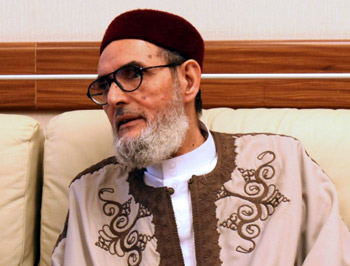By Valerie Stocker.

Tripoli, 22 October:
Libyans will have to pay the price of their hypocrisy, says Sheikh Sadeq Al-Ghariani, referring to a . . .[restrict]multi-party system he deems unsuitable for the country.
In a commentary entitled “Latest Surprises from the General National Congress”, Ghariani criticises the people and parties that currently make up the National Congress and calls the political system created in the aftermath of the revolution “a failed experiment”.
The first “surprise” Ghariani points out is the fact that the two rivalling factions within the Congress eventually managed to agree on Ali Zidan to be Libya’s next Prime Minister after having dismissed Mustafa Abushagur in a vote of no-confidence seven days earlier.
Also surprising, he says, is the unprecedented soberness or detachment with which they made this choice, considering how fiercely the political forces had been competing against each other previously. This, he argues, proves that both sides wanted an independent broker to head the future government, one who did not clearly belong to either of the factions.
But the decision was not reached without controversies, as lengthy debates arose within the Congress over how to define “independent”: Is it formal criteria such as a candidate’s official position that matter or does the issue really come down to his personal attitude, no matter what or who he previously represented? This is not a theoretical question as Libyans disagree on whether ministers should renounce their membership of a political party before coming into office, which is what they are currently required to do.
Following these rather positive remarks Ghariani gets down to his actual mission, which is to point out the shortcomings of Libya’s new system of government and its current representatives.
While Congress members proved their maturity and impartiality by choosing Ali Zidan as prime minister, their move was in fact an admission that the political entities are weak and unable to govern the country at this stage. One reason for these shortcomings is Libya’s lack of experience with political parties, whose creation should have been postponed until after a Constitution is drawn up, he argues.
Party politics has resulted in quarrels, self-interest seeking and regionalism within the Congress, to the point where “principles were sacrificed for the sake of partisan and regional gains”. There is no lack of examples that illustrate the weakness of the GNC, he says.
Lack of transparency seems to be Ghariani’s main concern, as he points out that the Congress still operates without a proper government, making it difficult to implement decisions and follow up how public funds are being spent, and that little is known even about the Congress members themselves. “Are the Congress members aware of what is going wrong or will it come as a surprise to them some day?” he wonders.
The main problem, according to the grand mufti, is what he sees as an imposed multi-party system.
Whilst some members of the old National Transitional Council were enthusiastic about the idea, they failed to convince the other side. “(Even) the media, who initially supported it, now acknowledge the experiment is a failure”, he claims.
He also criticises the way this system was put into practice, in particular the rules that were set up to select candidates and establish party lists: “For some parties it became a matter of filling in blanks only to comply with the rules!… The voters were left to choose between the unknown and the stroke of luck… just as gambler who doesn’t know what he gets on his hand”, he says. They were duped into believing that they voted for highly qualified candidates only to find out later that those representing them were nothing but common people.
“Expecting a male candidate, they eventually got a woman, or the other way round!”, he protests. As a result, he argues, many congressmen took office without a real programme and then engaged in political horse-trading, since “every Congress seat has its price and value”.
Nevertheless, Ghariani thinks that a closed-list party system can work in a country with a stable and transparent political regime in which voters are well informed about party programmes and have the experience required to make the right choices.
Libyans, however, made the mistake of “climbing the ladder from above so that they could not be accused of opposing democracy or the participation of women in politics” and will have to “pay for this leap” before even acquiring the basics. “I could say [we will pay] the price of our hypocrisy’”, he concludes.
[/restrict]







